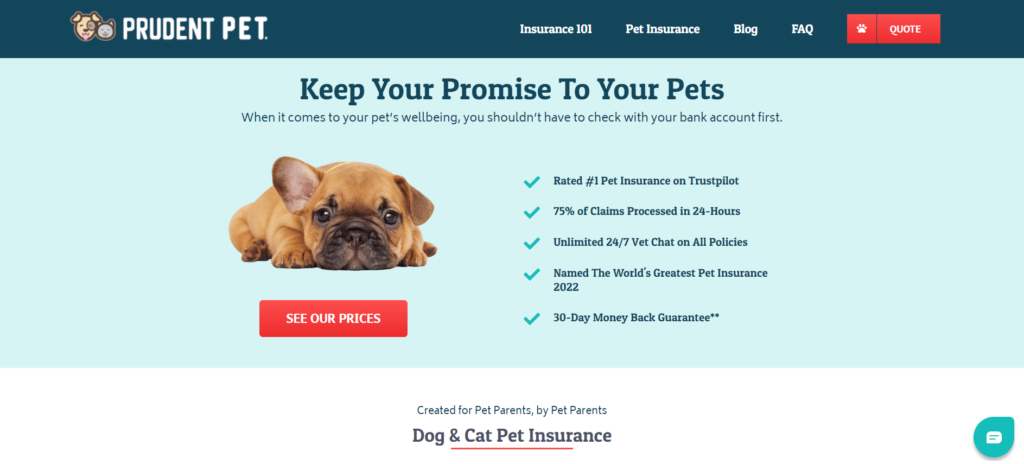When it comes to your pet’s health, accidents can happen unexpectedly, and emergency vet bills can be overwhelming. Emergency pet insurance is designed to help with the financial burden of sudden accidents, providing coverage for situations such as car accidents or swallowing foreign objects.
While emergency pet insurance doesn’t cover illnesses, it can be a crucial lifeline during traumatic events. In this guide, we will explore the best emergency pet insurance options available in 2024, along with their benefits, drawbacks, and key features to help you make an informed choice.
What Is Emergency Pet Insurance?
Emergency pet insurance, also known as accident-only insurance, provides coverage specifically for accidents. It does not cover illnesses or preventive care. It covers situations like a pet being hit by a car, swallowing objects, or sudden injuries. These plans are generally more affordable than comprehensive policies and can help protect pet owners from large, unexpected vet bills. If you want coverage for illnesses like cancer or diabetes, you’ll need to look for a more comprehensive accident-and-illness plan. However, if budget constraints are a concern, emergency pet insurance is a great option.
Best Emergency Pet Insurance Companies
We reviewed multiple pet insurance companies and ranked them based on factors like cost, coverage features, claim turnaround time, and more. Here are the top picks for emergency pet insurance:
1. AKC Pet Insurance – Best Overall
AKC Pet Insurance tops the list for offering the best value in accident-only coverage. Their emergency plan provides 90% reimbursement after a $100 deductible, with no annual coverage limit.
Key Features:
- Annual deductible: $100
- Reimbursement rate: 90%
- Claim turnaround: 2 days
Pros:
- High-value coverage with unlimited annual benefits
- Quick claims processing within 2 days
- 24/7 vet helpline available
Cons:
- Some accidents are covered only once
- Not available in all states
2. Pets Best – Cheapest & Best for Older Pets

Pets Best stands out for being the most affordable emergency pet insurance provider, especially for older pets. Their accident-only plans cost as little as $6 per month for cats and $9 for dogs.
Key Features:
- Annual deductible: $250
- Reimbursement rate: 90%
- Claim turnaround: 3-5 days
Pros:
- Ultra-low monthly premiums
- No maximum age limit
- Direct-pay option for vet payments
Cons:
- Claim processing can be slower than advertised
3. Nationwide Pet Insurance – Best for Young Pets

Nationwide offers excellent pricing for younger pets, with accident-only plans starting at around $16 per month. They also cover a wide range of pets, including birds and exotic animals.
Key Features:
- Annual deductible: $250
- Reimbursement rate: 100%
- Claim turnaround: 30 days
Pros:
- High annual benefit limits ($10,000 for dogs, $14,000 for cats)
- Covers exotic animals such as birds, reptiles, and more
Cons:
- No direct-pay option
- Claim turnaround time is slow (up to 30 days)
4. Prudent Pet Insurance – Fastest Claim Reimbursement

Prudent Pet Insurance offers the fastest claim turnaround time, paying out within 1 to 3 days. Their plans are highly customizable, allowing you to choose your deductible and reimbursement rates.
Key Features:
- Annual deductible: $100 – $1,000 (flexible)
- Reimbursement rate: 70% to 90%
- Claim turnaround: 1-3 days
Pros:
- Fast claims processing
- Customizable plan options
- Affordable premiums for those opting for high deductibles
Cons:
- Some plans may provide insufficient coverage for high-cost emergencies
5. ASPCA – Best for Horses
ASPCA offers accident-only plans that include coverage for horses, a feature that is not commonly available. They also provide coverage for cats and dogs, with flexible plan options.
Key Features:
- Annual deductible: $100 to $500
- Reimbursement rate: 70% to 90%
- Claim turnaround: 30 days
Pros:
- Covers cats, dogs, and horses
- Direct-pay option available
- No maximum age limit for pets
Cons:
- Limited availability for horse coverage
- No 24/7 vet helpline
How Much Does Emergency Pet Insurance Cost?
The cost of emergency pet insurance varies based on factors such as your pet’s age, breed, and location. Premiums typically range from $5 to $50 per month, with older pets generally facing higher costs. For example, a 3-year-old cat might have a monthly premium as low as $10, while an 8-year-old dog could have premiums exceeding $80.
Premiums are also influenced by:
- Deductible: Higher deductibles lead to lower premiums.
- Reimbursement rate: Policies with lower reimbursement percentages tend to be cheaper.
- Annual limits: Some plans cap annual benefits, while others offer unlimited coverage.
How Does Emergency Pet Insurance Work?
Once you purchase an emergency pet insurance policy, you’ll pay a monthly premium in exchange for coverage. If your pet has an accident, the insurer will either reimburse you for eligible vet costs or pay the vet directly, depending on the policy.
You are responsible for paying a deductible and a portion of the remaining vet bills, known as co-insurance. For example, if you have a $500 deductible and a 90% reimbursement policy, a $5,000 vet bill would leave you paying $950 out-of-pocket (including the deductible and co-insurance).
What Is Not Covered by Emergency Pet Insurance?
Emergency pet insurance typically only covers accidents and does not cover illnesses, routine care, or preventive treatments. It’s important to understand that conditions like cancer, diabetes, or infections will not be covered under accident-only policies. For broader coverage that includes illnesses, pet owners should consider a more comprehensive accident-and-illness plan.
Conclusion
Choosing the right emergency pet insurance can give you peace of mind in case of a sudden accident. AKC Pet Insurance offers excellent value overall, while Pets Best provides the most affordable coverage if your pet is older. For younger pets, Nationwide is a solid choice with competitive pricing, and Prudent Pet Insurance offers the fastest claim payouts. If you’re looking for coverage for horses, ASPCA is the go-to option.
Ultimately, the best emergency pet insurance for you depends on your pet’s needs, your budget, and the level of coverage you want. While accident-only policies provide great protection against sudden accidents, they do not cover illnesses. It’s important to evaluate all options and choose a policy that best fits your financial and pet care situation.
So that was all about this article. If you have any further questions feel free to comment down below. We are always here to help you!
FAQs
1. What is emergency pet insurance?
Emergency pet insurance covers unexpected accidents and emergencies, such as injuries from accidents, swallowing foreign objects, or urgent surgeries. It is not designed to cover illnesses or routine care.
2. How does emergency pet insurance differ from regular pet insurance?
Emergency pet insurance only covers accidents and emergency situations, while regular pet insurance (accident and illness plans) covers both accidents and illnesses, including chronic conditions and diseases.
3. What does emergency pet insurance typically not cover?
Emergency pet insurance does not cover illnesses, routine vet visits, vaccinations, or preventive care. For such coverage, you’ll need an accident and illness or wellness plan.
4. Can I get emergency pet insurance if my pet is older?
Yes, many emergency pet insurance plans, such as those from AKC and Pets Best, do not have age limits for enrollment, making them suitable for older pets.
5. How much does emergency pet insurance cost?
The cost of emergency pet insurance can range from $5 to $50 per month, depending on factors like the age, breed of your pet, and your location.
6. Does emergency pet insurance have a deductible?
Yes, most emergency pet insurance plans have deductibles, which typically range from $100 to $1,000. The amount you choose impacts your premium and out-of-pocket expenses.
7. What is a reimbursement percentage in emergency pet insurance?
A reimbursement percentage is the portion of your vet bill that the insurance will cover after you’ve paid your deductible. Common options range from 70% to 90%.
8. How quickly do claims get processed for emergency pet insurance?
Claim processing time varies by provider. Some, like Prudent Pet, process claims in as little as 1-3 days, while others may take up to 30 days.
9. Can I get emergency pet insurance for exotic pets?
Yes, Nationwide and ASPCA are among the few providers that offer emergency pet insurance for exotic animals, including birds and reptiles.
10. Can I get emergency pet insurance after my pet has been diagnosed with a condition?
Yes, you can still purchase emergency pet insurance, but most plans will not cover pre-existing conditions unless the insurer specifies otherwise, like AKC, which covers certain conditions after a waiting period of 365 days.
11. What is the waiting period for emergency pet insurance?
The waiting period for coverage to begin can range from 2 to 30 days, depending on the insurer. For example, AKC offers a 2-day waiting period for injury coverage.
12. How do pet insurance companies verify pre-existing conditions?
Insurers may require a recent veterinary exam or your pet’s medical history to check for pre-existing conditions before the policy begins.
13. Is there a limit to how much emergency pet insurance will pay?
Yes, most policies have an annual limit. For example, Pets Best offers a $10,000 annual benefit, while other companies like AKC provide unlimited annual coverage.
14. Can emergency pet insurance pay my vet directly?
Some insurers, like Pets Best and ASPCA, offer direct payment options, which means the vet is paid directly, and you don’t need to wait for reimbursement.
15. Does the cost of emergency pet insurance increase as my pet ages?
It depends on the provider. Pets Best, for instance, does not increase premiums due to age or breed, while other insurers may raise rates for older pets.




